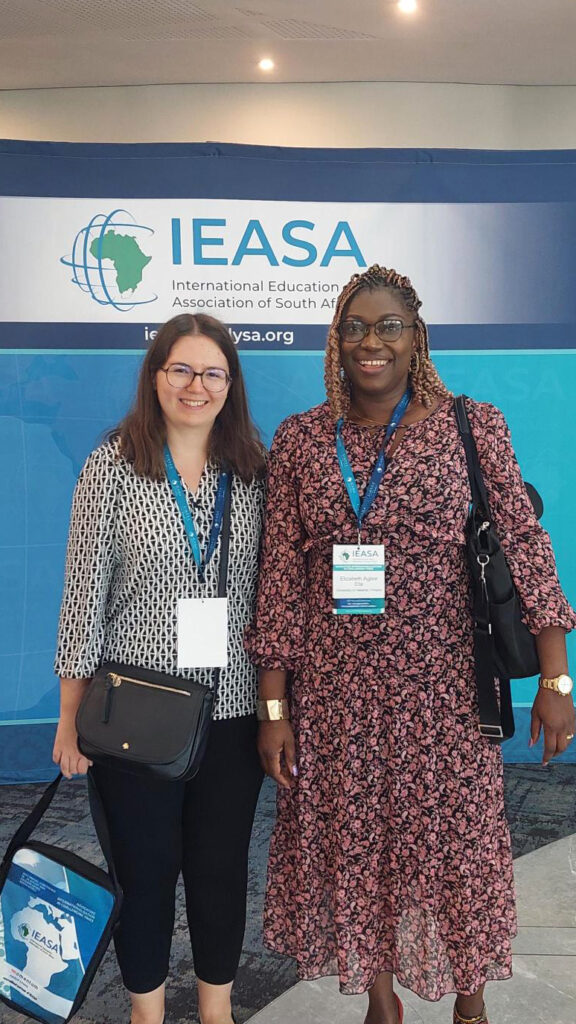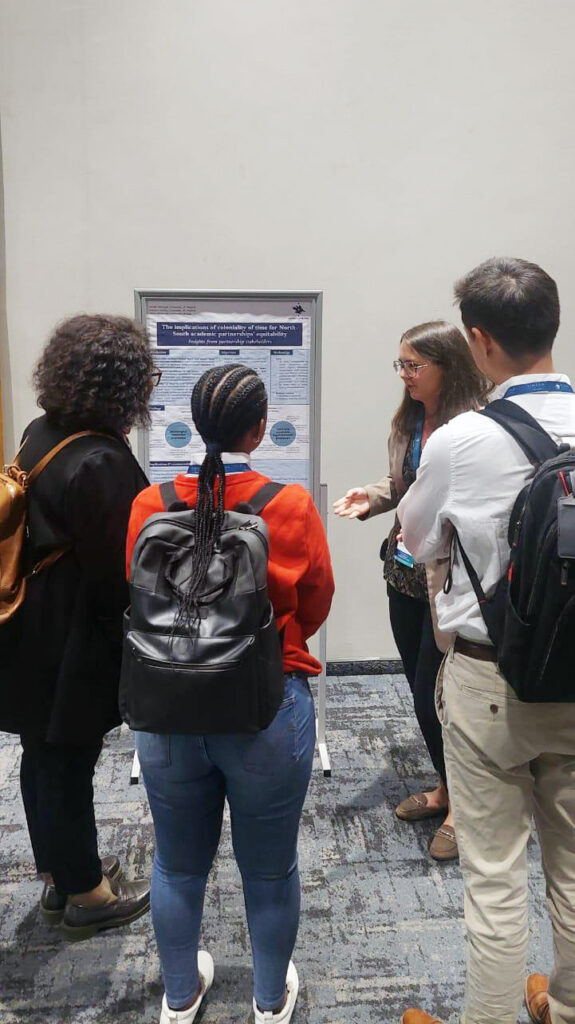
In August, we had the opportunity of participating in the 26th Annual Conference of the International Education Association of South Africa, themed ‘Navigating Internationalisation in Challenging Times.’ This conference allowed us to engage with international scholars on higher education internationalisation and to reflect on partnership dynamics, also from a global South perspective. During the conference, Elizabeth Eta presented their ongoing research with Nico Stockmann, Hanna Kontio, and Elina Lehtomäki on ‘Global Asymmetries in International Doctoral Education: An Examination of Dissertations on Educational Development in Africa at Finnish Universities,’ while Anaïs Georges presented her research on ‘The Implications of Coloniality of Time for Equity in North-South Academic Partnerships: Perspectives of Finnish-African Partnership Stakeholders’.
The participation in this conference offered invaluable insights into how partnerships are framed and experienced differently across contexts, highlighting the challenges inherent in developing responsible North-South partnerships, which we discuss in this blogpost with a focus on communication as an enabler or obstacle to responsible partnerships.
Image (left): Elizabeth Eta and Anaïs Georges at the IEASA conference
What does responsible partnership entail?
The term ‘responsible partnership’ is often taken for granted, with a general expectation and assumption that partnerships should be inherently responsible. However, what constitutes a responsible partnership, who defines it, and how do we ensure it is practiced? Do partners engage in dialogues about what a responsible partnership is and how to enhance it? What conditions are needed for a responsible partnership to flourish?
Based on literature and the discussions we participated in, responsible partnerships seem to be an umbrella concept that encapsulates ethical considerations in the different phases of the partnership – from partner selection and agenda setting to project design, implementation, and evaluation – that allow for equitable, reciprocal, and sustainable partnerships, just to name a few.
Despite efforts to create responsible partnerships, colonial tendencies including asymmetrical power dynamics favouring the global North remain visible. Global North partners often assume the role of funder, expert, and administrators/coordinators, which can marginalise the voices of global South partners.
The voice of global South partners needs to be heard, but what is the best way to achieve this? What constitutes responsible interaction among partners, and what language should be used to facilitate this?
Communication as an enabler or barrier to responsible partnerships
Communication is a central component of partnership dynamics. It has the potential to either facilitate or impede the development of responsible collaboration. However, in many North-South partnerships, communication reflects and reinforces existing power imbalances. Terms like ‘ethical,’ ‘sustainable,’ and ‘mutually beneficial’ are frequently used to describe partnership objectives, while words such as ‘co-creation,’ ‘co-learning,’ and ‘co-sharing’ describe the intended working methods. Yet, these terms are rarely defined. The assumption that all partners share a common understanding of these concepts can lead to miscommunication, misunderstandings, and even abuses of power, resulting in a significant mismatch between expectations and realities.

The fact that most partnership funding comes from the global North, explicitly or implicitly positions Northern partners at the centre of knowledge production and dissemination. This perpetuates a narrative where the global North is seen as the ‘helper’ or ‘provider’ of expertise, while the global South is cast in the role of the recipient in need of assistance.
These dynamics raise fundamental questions: If partnerships are truly responsible, in this case mutually beneficial, why is the discourse of ‘help’ and ‘assistance’ so prevalent? Why do global South partners often feel compelled to seek out partnerships using this same language of dependency? Such language reinforces persisting colonial structures and become powerful determinants of who gets funding and how partnership projects are conceptualised, and the cycle continues. If we are serious about fostering responsible partnerships, we must critically examine the language we use. We need to shift towards language that reflects equity, mutual respect, and shared benefits.
Communication as an inclusion and exclusion tool
The way in which we communicate – when, why, how, what and with whom – plays a crucial role in either fostering or hindering responsible North-South partnerships and partnerships in general. Key questions arise:
- When do we invite partners into discussions about partnership?
- How transparent are we about their roles within the partnership – is it just to meet funders requirements (which is sometimes the case as we have seen)?
- With whom do we communicate about funding requirements and decisions, implementation challenges, and the search for solutions?
- Do all partners feel equally involved in these discussions or are they reserved for a chosen few?
One of the significant barriers to building responsible North-South partnerships is the exclusion of certain partners from vital information at various stages of the partnership. Too often, global South partners are left out of key information. This exclusion perpetuates the power imbalances that responsible partnerships are meant to mitigate.
The concept of ‘development’ in these partnerships is frequently framed by the global North’s vision of what the global South needs, without sufficient input from the latter. Who decides which themes and priorities are pursued in partnerships and how they are communicated?
Furthermore, the metrics used to evaluate the success of these partnerships often focus on what the global South partners have learned or gained, rather than on what both sides have contributed and benefited from. This one-sided reporting reinforces the notion of the global North as the expert transferring knowledge to the global South, which runs counter to the stated objectives of co-creation, co-learning, and co-sharing. For partnerships to be truly responsible, both parties must engage in mutual learning, and we must consciously make room for this mutuality to be communicated.

Problematising and politicising dialogues on internationalisation
The push for higher education institutions to internationalise is a key factor driving the growing development of academic partnerships. Internationalisation is often treated as both a natural and neutral process. In reality, opportunities to participate in and benefit from it are highly unequal. Due to persistent colonial power dynamics, and uneven access to resources, global North institutions hold the most power to globalise their worldviews, knowledge, and agendas, while global South institutions often find their perspectives marginalised. To establish responsible international partnerships, we need to openly discuss and critically question the underlying values, aims, and impacts of internationalisation, as well as what constitutes meaningful international exchanges.
Image (left): Anaïs Georges, discussing her research during the poster session
Which partners are prioritised in building partnerships? What is considered valuable knowledge and quality research in international higher education? What are the true goals of international partnerships? What criteria are used to assess the impact of these partnerships? Open and equal North-South dialogue is essential to challenge the foundations of internationalisation and redefine its frameworks, criteria, and aims. This will help ensure that international partnerships become spaces for the exchange of diverse knowledge and perspectives, fostering genuine mutual learning and co-creation.
Widening the dialogue on decolonising higher education internationalisation
The reflections so far highlight the crucial need to decolonise partnerships. However, discussions on decolonisation are often accompanied by unease, sensitivity, and a sense of ‘walking on eggshells.’ The concealed yet pervasive dominance of the global North in higher education and internationalisation processes generates reluctance to fully acknowledge the persistence of colonial structures and power imbalances. This hesitation hinders efforts to dismantle these structures. Long-standing, inflexible systems further complicate the translation of decolonisation discourses into concrete and impactful actions toward more equitable North-South academic partnerships.
To foster genuine transformation, it is crucial to involve all stakeholders in international higher education – from policymakers to administrative and academic staff – in meaningful dialogue and sustained training on decolonisation. Without broad-based commitment and concrete steps, the discourse on decolonisation risks remaining a theoretical exercise rather than a catalyst for real change.
Concluding remarks
Although we have primarily discussed how communication can enable or hinder responsible North-South partnerships, it is important to note that these issues are present in partnerships more broadly, although the degree to which they manifest and are experienced may vary.
Building responsible partnerships requires a commitment to ethical principles, as well as recognising and dismantling colonial structures. Communication is central to this process. To foster partnerships that are truly responsible, we must begin by critically examining the language we use and the power dynamics inherent in our communication practices.













